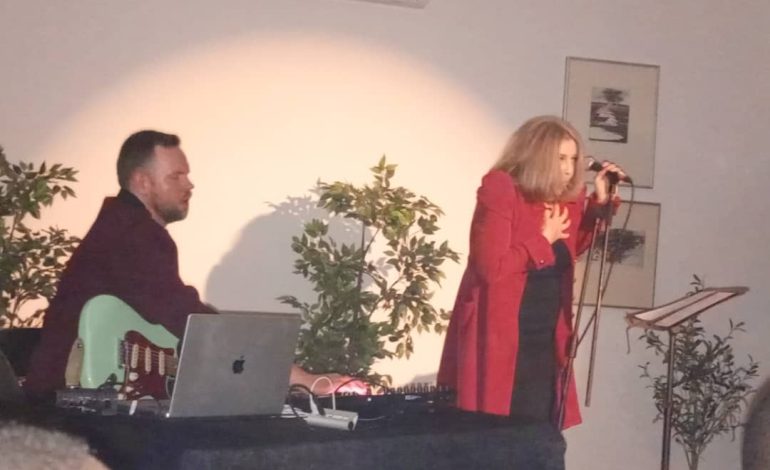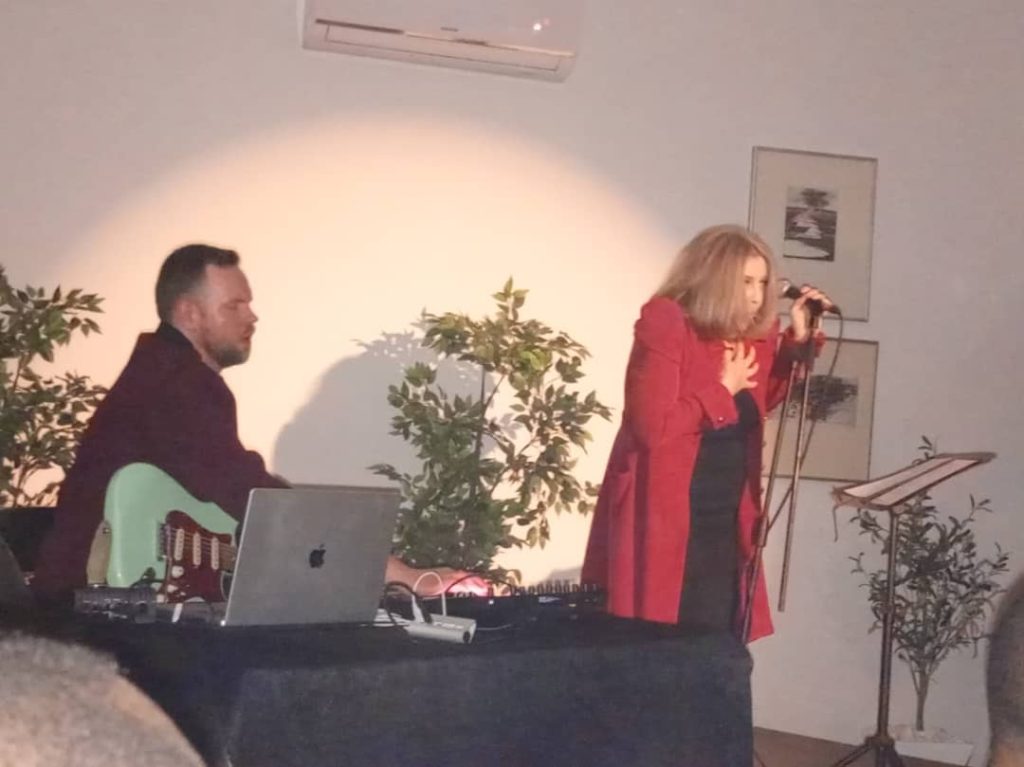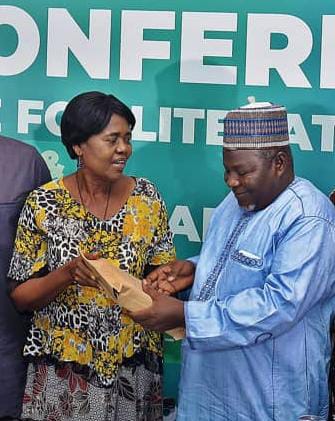Neo avant-garde performance: When Pendry, Ashim hit Nigerian stage with ‘Cripplewolf’

By ‘Bode Ojoniyi
OMO-OBA Jerry Adesewo of Arojah Royal Theatre and Seun Odukoya, popularly known as Aunty Shine-Shine, had spoken to me about a performance holding at the Embassy of Norway… Since I arrived the University of Abuja in March this year from the University of Maiduguri, they have been facilitating my meeting the stakeholders in the culture and the arts industry in Abuja. Although, I have known Omo-Oba Jerry for over two years now through our connection at Society of Nigerian Theatre Artists (SONTA), it was at the celebration of 2024 World Theatre Day, where I had gone to represent my Head of Department on a discussion panel, that we formally met in Abuja. I was meeting Seun Odukoya, Aunty Shine-Shine for the first time. We have since bonded as if we had known each other from birth… I indicated my availability to see the performance. If there is anything I am addicted to it is making or devising dramas and performances. That is my opium…
My name and email address were forwarded to the embassy. And a few days later, I received an email from the embassy officially inviting me to see the performance of Cripplewolf as a friend of the embassy. The performance would be on Thursday, 18 April, 2024. Meanwhile, the same play would also be performed at the Brazilian Embassy on Monday, 15 April, 2024. We agreed to see the performance at the Brazilian Embassy as well. So, on Monday 15, I joined Seun at her office at Gudu area, from where we drove to the Brazilian Embassy on Diplomatic Drive. We arrived quite on time. Quite a number of stakeholders in the theatre and the performing arts business have equally arrived the venue. We got talking about issues relating to the business of the arts as we were being treated to some light refreshments. Then it was time for the performance and we were ushered into the ‘theatre’. The play was introduced and Kate Pendry and Audun Ashim, the two artists, moved to the stage…
Let me quickly say one or two things about the stage. The stage was not a very big stage. On the stage, to the right of the audience was a microphone on a stand and another stand like the type used in symphony orchestras for holding musical scores. On it was a similitude of the performance’s score of physical actions and music. To the left of the audience was a table, with a computer, a guitar, a mini piano, an amplifier and a chair. The computer, the mini piano and the amplifier were set on the table. Pendry moved to the microphone and the score stand was to her left, while Ashim moved to the chair behind the table. He picked the guitar and hanged it on his neck, ready to play. This arrangement of the stage itself is revolutionary and provocative. Of course, there were assorted lights of different types and shapes set up for the performance. Now, as the play began, Pendry introduced Ashim as her partner in ‘crime!’ This unusual introduction of Ashim as Pendry’s partner in performance crime perhaps set the tone of a sense of apprehension as to what is to come in the performance. As we were engaged in the ‘mental’ crisis of picturing the two artists before us as ‘partners in crime’ and wondering what mischievous crime they would be up to before us, the re-enactment of the crimes began before us in earnest and we would be glued to the actions on that stage for about 47 minutes…

Audun Ashim (left) on the piano and Kate Pendry on the microphone performing Cripplewolf in an unconventional stage… in Abuja PHOTO: OMO-OBA JERRY ADESEWO
Whoever says it is not a crime for humanity to be in the world in the face of overwhelming intractable existential crisis with which it is confronted daily would need to see the play, Cripplewolf. Pendry speaks of the play as tale of ‘family and misery and love and silence… and misery.’ The play centres around a couple, Alfred and Rita. After the birth of their son, Alfred transfers his love/affection from Rita to the boy. Of course, this transfer of Alfred’s affection from Rita to the boy is arguably underlined by patriarchal temper of mind – such temper of mind that sees the value of a woman only in being able to give birth to a ‘special specie’ called a male child. This development, the affectionate abandonment of Rita for their baby sparks a sense of mental/psychological contradictions in Rita. Of course, it is equally suggestive in the play that Rita is perhaps not really interested in making any baby. Perhaps, Rita also only wants to live with Alfred in a world of a seeming utopian of affection and love – a world which unfortunately only seems to exist in human dreams and illusions.
It thus appears the birth of the baby which ought to bring additional sense of joy and happiness to the couple only actually achieves the opposite. To worsen the matter, two unfortunate existential developments seal off the fate of the marriage in irredeemable miseries. The first is the fall of the baby from a kitchen table after which he becomes crippled. As expected, the fall is naturally blamed on Rita by Alfred and their neighbours, the usual community gossips. To them, the fall of the boy is a deliberate action by her, whereas, it is not. The second is the eventual drowning of the boy in a flood while playing in the garden. The drowning is equally blamed on Rita… Now, this pathetic story is rendered in a form of psychological narration through different dramatic techniques by Pendry who assumes different characters, becoming their voices, in the telling of the tale of love, hope, frustrations and miseries.
In telling their tales of woes and miseries, Pendry explores the powers of how individuals develop psychological crisis as a result of growing mental contradictions arising from humans’ inability to reconcile their desired expectations, their dreams with their lived experiences and realities. In essence, the problem seems to be in the fact that we always seek fulfilment in the other[s] or thing[s], and not in ourselves. Rita seeks fulfilment in Alfred’s affection. Alfred seeks fulfilment in his baby boy… Men and women seek fulfilment in marriages, families and homes. Unfortunately, after getting into a marriage and one could not find any sense of fulfilment in it, one gets accustomed to the miseries in the home like Alfred and Rita until one is wrecked psychologically like the two. When a false object of fulfilment like the boy-child becomes crippled and is eventually drowned, the family collapses and is ruined as it happens between Alfred and Rita…
The play confronts us with a lot of seeming verbal violence that jolts us out of our pretentious civility and decorum. For instance, the word ‘fuck’ is freely used by both Alfred and Rita in the expressions of their frustrations with what can be seen as apparent dysfunctional sexuality in their marriage. What ordinarily should be an instrument of bonding is turned to instrument of social and psychological war. Of course, it appears the word is pushed to our faces deliberately and delicately by Pendry, who delivers the lines with such wizardry dexterity as of the three weird sisters who met and hailed Macbeth on his way back home from the battle, if I still remember, with Norway. Pendry is such a forceful artist – she masterfully transitions between different characters with such voicing (voice modulations) and facial expressions that express the psychological intensity that carries and conveys the state of the trauma and the depressions of the characters in the play to us vividly. Of course, Ashim is equally able to live up to the identity of being her partner in crime in performing the play as he masterfully follows Pendry’s movements and actions with different sounds and music, including playing the guitar and the mini piano to accompany the emotional drifts of Pendry as she represents the characters…
After seeing Cripplewolf on Monday, we still decided to see it again at the Norwegian Embassy. And, for me, the play is not just an experimental performance in the sense of the old experimental plays that we are familiar with on the Nigerian stage. It is something new and unique. It is something to be seen as a neo avant-garde performance. In the coming days, I hope I would be able to settle down to do a full existential academic review of the text, the performance and the two performance-devising partners in crime, Pendry and Ashim!
* Dr. Ojoniyi, of the Department of Theatre Arts, University of Abuja, first published this piece in https://ojoniyiolabode.blogspot.com/2024/04/neo-avant-garde-performance-on-nigerian.html



